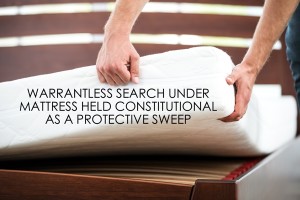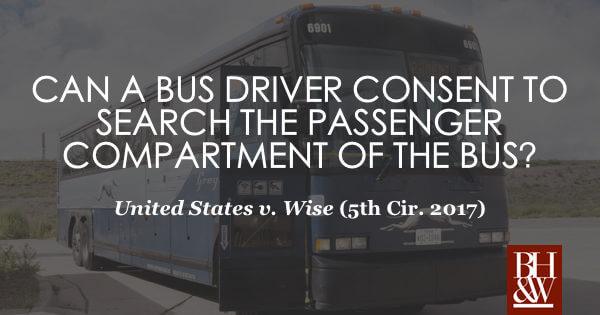United States v. Garcia-Lopez (5th Circuit, 2016)
 FACTS: On February 5, 2014, the Wharton County Deputy Sheriff’s Department served a felony arrest warrant on Yonari Garcia at his father’s trailer home. Yonari’s father told law enforcement that Yonari was not home, however, consented to a search of the trailer. Upon entry, Garcia-Lopez, Yonari’s brother, made a beeline for a bedroom, closing and locking the door. Law enforcement followed Garcia-Lopez and demanded that the door be unlocked. Garcia-Lopez opened the door and the police entered, continuing the search for Yonari. Garcia-Lopez asked if he could sit on his bed and eat his dinner while police searched the room. The police obliged the odd request. A minute later, law enforcement discovered two sets of bullet-proof vests in plain sight, prompting a background check. Garcia-Lopez was a convicted felon and having the body armor was a violation for being a felon in possession of body armor, U.S.C. § 922(g)(1). The police arrested Garcia-Lopez after being in the home a total of three minutes. After the arrest, police continued searching the Garcia-Lopez’s room. Concerned Yonari might be sheltered in a hollowed-out mattress, the police lifted the bed up, discovering ammunition and three handguns sandwiched between the mattress and box springs. After a total of seven minutes inside the trailer, the police left with Garcia-Lopez under arrest.
FACTS: On February 5, 2014, the Wharton County Deputy Sheriff’s Department served a felony arrest warrant on Yonari Garcia at his father’s trailer home. Yonari’s father told law enforcement that Yonari was not home, however, consented to a search of the trailer. Upon entry, Garcia-Lopez, Yonari’s brother, made a beeline for a bedroom, closing and locking the door. Law enforcement followed Garcia-Lopez and demanded that the door be unlocked. Garcia-Lopez opened the door and the police entered, continuing the search for Yonari. Garcia-Lopez asked if he could sit on his bed and eat his dinner while police searched the room. The police obliged the odd request. A minute later, law enforcement discovered two sets of bullet-proof vests in plain sight, prompting a background check. Garcia-Lopez was a convicted felon and having the body armor was a violation for being a felon in possession of body armor, U.S.C. § 922(g)(1). The police arrested Garcia-Lopez after being in the home a total of three minutes. After the arrest, police continued searching the Garcia-Lopez’s room. Concerned Yonari might be sheltered in a hollowed-out mattress, the police lifted the bed up, discovering ammunition and three handguns sandwiched between the mattress and box springs. After a total of seven minutes inside the trailer, the police left with Garcia-Lopez under arrest.
See the 5th Circuit’s full opinion in United States v Garcia Lopez.
Garcia-Lopez Indicted for Federal Firearms Charges
In March 2014, Garcia-Lopez was indicted on six counts of being a felon in possession of a firearm in violation of USC §§ 922(g)(1) and 924(a)(2). During an evidentiary hearing, the district court denied Garcia-Lopez’s motion to suppress the guns found under the mattress because law enforcement was originally in the trailer for a legitimate purpose and they had a right to search the home pursuant to the valid arrest warrant for Yonari. The court added that upon the valid search of the premises, law enforcement found contraband and arrested Garcia-Lopez. Further the court stated that upon his arrest, law enforcement had the right to make a protective sweep, so long as it did not last an unreasonable amount of time. Additionally, there was testimony that indicated that suspects have been known to hide in hollowed-out mattress to evade arrest. According to the district court, the search for Yonari and seizure of the guns was proper in every way. Garcia-Lopez was sentenced to forty-six years imprisonment and two years of supervised release. Garcia-Lopez appealed to the Fifth Circuit Court of Appeals, arguing that law enforcement’s belief that Yonari might have been hiding in the bed was unreasonable, and thus, unconstitutional.
Was Lifting the Mattress an Unconstitutional Search or a Lawful Protective Sweep?
The Court of Appeals must determine whether the act of “lifting up the mattress” and seizing the guns violated Garcia-Lopez’s constitutional rights. In other words, was lifting the mattress an unconstitutional search under the Fourth Amendment’s protection against unreasonable searches and seizures?
Under the Fourth Amendment, warrantless searches are pre se unreasonable. Coolidge v. New Hampshire, 403 U.S. 443, 474-75 (1971). A protective sweep may be conducted with [a lower threshold of] reasonable suspicion, probable cause is not necessary. Maryland v. Buie, 494 U.S. 325-27 (1990). “There must be articulable facts which, taken together with the rational references from those facts, would warrant a reasonably prudent officer in believing that the area to be swept harbors an individual posing danger to those on the arrest scene.” Id. A protective sweep [must be] quick and…limited to the safety of the police. Id. Evidence seen in plain view during a lawful sweep can be seized and admitted into evidence during trial. United States v. Jackson, 596 F. 3d 236, 242 (5th Cir. 2010).
5th Circuit Holds that the Warrantless Search of the Mattress was Reasonable
Here, the Court of Appeals held that the district court’s finding of reasonable suspicion was correct because of the amount of evidence supporting such a claim. First, law enforcement became suspicious because of the standoff over the locked door. Second, Garcia-Lopez’s odd request to sit back down on the bed while the police conducted the search is suspicious in light of the circumstances. Third, the belief that a suspect could be hiding in a hollowed-out mattress is reasonable given police training and data supporting such a claim. Fourth, the search lasted a total of seven minutes—a reasonable amount of time to conduct a protective sweep. In sum, the Court says it was logical under the specific facts of this case to suspect that Yonari might have been hiding in the mattress. The Court affirms the district court’s judgment—the warrantless search under Garcia-Lopez’s mattress was not unconstitutional under the circumstances.










